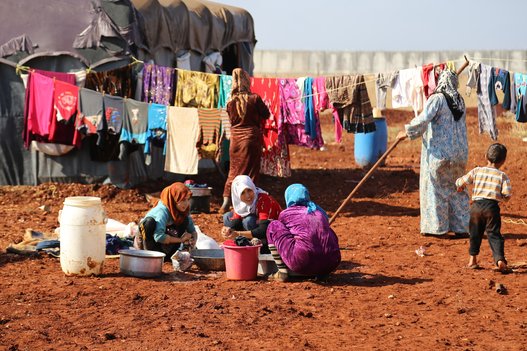Coping With War's Consequences: Syria
"Most of them left either after their house was destroyed, or they had at least one or two close relatives or friends who died."
"We have people who have quite a lot of signs of stress, depression and so on."
Paul Yon, head, Medecins Sans Frontieres Lebanon mission
"In many ways, a migration like this is unprecedented ... the numbers could be staggering. [But] there are a lot of health-care workers who really want to contribute."
Dr. Meb Rashid, medical director, Crossroads Clinic, Toronto
"I saw a lot of Syrian refugees who came to Turkey and they did not receive what they expected in support ... They decided by themselves to go back to Syria, to areas in the middle of the conflict, putting themselves in 100 percent risk of death."
"They decided to do this rather than stay in a country that provided them with a safe environment, but no other type of understanding or support."
Mohamed Elshazly, International Medical Corps., California

Some of these refugees will eventually return to their country of origin when the conflict which has entered its fifth year of a tyrannical government turning its military loose on its own civilian population in a brutal sectarian war that has pitted an Alawite Shiite autocracy against the majority Sunni population of the country, eventually, somehow comes to a conclusion. The Sunni Syrians did not take up arms against their ruling elite, what they did was to mount protests against their unequal treatment as citizens of the state.
Those protests engendered a response that no one could have anticipated in its raging brutality where every and all Sunni Syrians are considered by the ruling Shiite minority to be 'terrorists' whom the regime is justified in wiping from the face of the Earth. Various countries of the world have resolved to do what they can to absorb tens of thousands of the resulting refugees comprised of Sunni Syrians, Syrian Christians, and minorities such as Kurds and Yazidis, along with gays, targeted by all.
 |
| Huffington Post |
This, apart from the Syrians who have left the country with no intention of settling anywhere but the wealthier of the European countries of their choice, enabling themselves with the use of human smugglers to find haven in particular areas, because they have the pecuniary means to buy that avenue of escape from Syrian bloodshed. The greater numbers of Syrian refugees living in sprawling camps in neighbouring countries haven't the means to buy their way into another country through migration.
Those countries like Canada that have stated a firm number of refugees they are committed to welcoming as new landed residents are anticipating both the burden and the responsibility of catering to the needs of people fleeing terror, leaving their homes behind. In Canada, medical providers know that they will be challenged by the needs the refugees will present. Refugees with war injuries, with chronic diseases under-treated for years, and those suffering from psychological stress.
Physicians and health clinics throughout the country have signed up as volunteers to lend their services to those in need. Although the medical system can hazard informed opinions relating to the kinds of medical services that will be required, until the reality presents itself when the refugees appear on Canadian soil and their needs begin the process of care, it is guesswork. It is evidently not infectious diseases that may present as a problem.
Refugees whose medical conditions have gone untreated while they have lived in countries like Lebanon, Iraq and Jordan likely will present with diabetes, hypertension and other chronic diseases having worsened during that period. Adults and children alike who suffered from the effects of both torture and bombs afflicting their bodies, who have never had adequate care, will also be expected to present with dire medical needs to be met.
 |
| Dr. Anna Banerji examines Noor-Zehra El-Maliki, who recently arrived from an Iraqi refugee camp in Turkey. (CBC) |
But it is the psychologically afflicted that ae expected to represent the most significant area requiring immediate attention. Four in ten Syrians appear to be suffering some manner of transitory mental health symptoms, readily treatable. Insomnia, loss of appetite, depression, represent the loss that people have suffered and the horrors they have been submitted to. The state of helplessness and desperation, dependence on the goodwill of others for rescue from dreadful situations makes further victims of people.
"They are in desperate need of serious psychological help and support to overcome the trauma and the horror they have been through", stated a study releasing the findings of academics in Jordan who had interviewed Syrian migrants in that country. In particular, the child refugees suffering mental health problems will be a realized challenge. Of refugees treated by the International Medical Corps. 54 percent were afflicted with a severe emotional disorder like anxiety or depression.
Another 27 percent were treated for epilepsy, while 17 percent had a psychotic condition like schizophrenia. The high numbers were attributed to the belief that these figures are an over-representation, given that people in distress sought out treatment. In Canada, on the other hand, there is a belief that roughly five percent of the 25,000 Syrian refugees expected to arrive will require professional mental health treatment.
The best-case scenario anticipation is that existential stability, decent housing, community support and eventual integration assistance into Canadian society will diminish mental health issues that most people in such situations struggle with.

0 Comments:
Post a Comment
<< Home